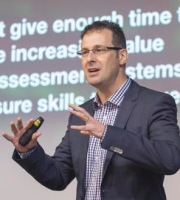Do students actually need to come to school to get what we are giving them?
I’m not just being provocative. Well, a little perhaps, but not entirely. At a recent conference, after showing a variety of educational podcasts, screencasts and recorded lectures available from such free services as iTunes U, I put this question to my audience: “Why will students still come to school in the future? What will we offer them at school that they won’t be able to get online?” The only answer offered was “credentialing”.
Once, knowledge was scarce. Students needed a local teacher to help them find the right knowledge and to explain it to them. Where else could they go? Being unschooled meant being uneducated. Not any more. Knowledge is now abundant and freely available to anyone. Now, if a student wants to learn biology, she can go online and listen to my podcasts and screencasts, or those of other biology teachers like Bozeman. If it’s maths that a student wants to learn, then McDonalds (yes, the restaurant chain) provides MathsOnline free to all Australian secondary school students.
I can hear the doubters saying “but students aren’t self-disciplined enough to seek out learning that way”. I disagree. So do the five hundred students who have downloaded my podcast this afternoon in the time it’s taken me to write this article.
When I was a teenager, the local music store was a favourite haunt! But music shops are becoming redundant because buying music online is so much more convenient.
It won’t be long before bookstores and newsagents also become redundant as books, magazines and newspapers become available for direct download to our iPads and other mobile devices. And if you don’t believe me – Arthur Sulzberger, the Publisher of the NY Times recently said “I really don’t know whether we’ll be printing the Times in five years” and last week Verizon (the dominant local phone company in the USA) is reported to have asked regulators for permission to end delivery of the printed “White Pages” phone book to all New York residents!
I think schools and universities are in danger of also becoming redundant, because just as with music, there will be more choice online, it will be more convenient, cheaper and will allow kids to learn when they want, where they want, as often as they want, for as long as they want and importantly, from whom they want.
This is a trend that is only going to accelerate. As young people increasingly turn to the Internet to access a smorgasbord of some of the best teachers in the world to explain topics to them – we need to ask what we will be offering students at school that they won’t get better, cheaper and more conveniently from their online teachers? And we have to come up with a more satisfactory answer than “credentialing”!
That’s why its so important that we reinvent ourselves as teachers, redefine what “Classroom” means and re-imagine the role school can play in the lives of our students.




You must be logged in to post a comment.